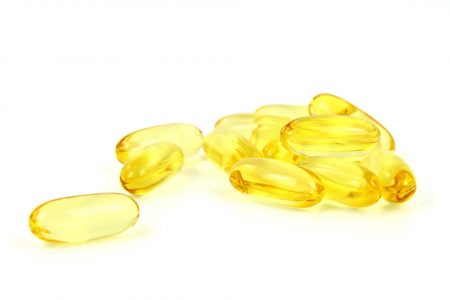
THE ROAD TO HEALTH: Vitamin D: why is it so important?
We spend less and less time outdoors – it is related to both the season and our lifestyle. Did you know that it can weaken your immune system? In the series “Road to Health. Do you know … that?” today a few words about vitamin D, necessary for the proper functioning of the immune system. I invite you to read! 🙂
Autumn is in full bloom. The days are getting shorter and we spend less and less time outdoors. Although we hear a lot about the harmful effects of sunlight on our skin, we should keep in mind that the right dose of sun’s rays is necessary for the synthesis of vitamin D, which I want to tell you about today. As research studies show, its role in keeping us healthy is huge, which results from a surprisingly wide spectrum of its activity.
What is Vitamin D?
Vitamin D is in fact a group of steroidal (fatty) compounds, which include, among others: vitamin D2 (ergocalciferol) and D3 (cholecalciferol). Vitamin D2 can be found in some plant foods and mushrooms. On the other hand, the richest sources of vitamin D3 are oily sea fish (such as salmon, mackerel, herring). When we consider the influence of vitamin D on the human body, vitamin D3 is much more important, as it has a higher metabolic activity and is more stable than vitamin D2.
Providing our body with the right amount of cholecalciferol solely through our diet is not easy. For this purpose, you would need to eat at least about 150-200 grams of baked salmon or 100 grams of herring in oil every day. It is worth mentioning that the content of this vitamin in one species of fish can vary significantly. This is due to several factors, including the place where it was caught. Estimated data show that we consume 100 to 200 IU of vitamin D3 per day in our food, which is only 10-20% of our daily requirement!

Vitamin D3 can also be synthesized in our skin through solar radiation. The amount of vitamin produced depends on many factors, including: latitude, time of year and day, skin tone, air pollution, and age. It is recommended to stay in sunny places for a dozen or so minutes on a regular basis. Interestingly, the amount of adipose tissue also affects skin synthesis. Obese people synthesize less vitamin D through their skin than healthy people. Endogenous synthesis remains the most important source of this vitamin for humans, but the vast majority of people spend too little time in sunny places to ensure a sufficient amount of it.
How Vitamin D Works
The function of vitamin D described in the literature most extensively is the regulation of the body’s calcium-phosphate metabolism. Vitamin D is essential, among others for the absorption of calcium from the gastrointestinal tract and proper bone mineralization. This is especially important for the prevention of osteoporosis and rickets in children.
It turns out that it also has anti-cancer properties, inhibiting the development of diseased cells. So far, it has been proven that vitamin D reduces the risk of cancer of the bladder, breast, colon, esophagus, stomach, ovaries, prostate, rectum, kidneys and uterus.
It is impossible to forget about the influence of vitamin D on the immune system. It remains a key regulator of the immune system’s response, thus influencing the proper functioning of the body’s defense mechanisms. The exact mechanisms of its action are still largely unknown, however, we do know that it affects, among others, the production of cytokines produced by leukocytes (including pro-inflammatory cytokines that initiate the inflammatory process in the body in response to the action of a damaging factor, e.g. virus, bacteria, toxic substance). So, if you want to take care of your immunity, remember to provide an appropriate dose of this vitamin every day, especially in the autumn and winter period.
The appropriate concentration of vitamin D is also associated with a lower risk of autoimmune diseases, including: type I diabetes, multiple sclerosis and inflammatory bowel diseases. Research studies have also shown that there is a connection between vitamin D deficiency and an increased risk of cardiovascular and nervous system diseases (e.g. Alzheimer’s and Parkinson’s).
The Results of Deficiency
Vitamin D deficiency can lead to:
- rickets in children;
- osteomalacia and osteoporosis in adults and the elderly;
- secondary hyperparathyroidism;
- cardiovascular diseases (coronary artery disease, stroke);
- disorders of the immune system;
- increased risk of developing certain autoimmune and neurological diseases, and certain cancers.
The Sources of Vitamin D – Where to Find It?
The best food source of vitamin D is oily sea fish and their oils. You can also find smaller amounts in meat, giblets, eggs, and mushrooms. In Poland, producers of spreadable fats (the so-called soft margarines) are obliged to enrich them with vitamin D.
However, the main source is skin synthesis, which supplies up to 90% of this vitamin! As indicated by the Food and Nutrition Institute, in our latitude, skin synthesis provides negligible amounts in the period from October to March, and it is recommended to stay in a sunny place for at least 15 minutes between 10:00 and 15:00 from April to September
When we take into account the current lifestyle which leads to spending less and less time outdoors, most of us cannot get enough vitamin D during the day, especially in winter. What is more, the consumption of sea fish in Poland remains low.
You must know that before our body uses the dose, vitamin D undergoes the so-called two-step hydroxylation in the liver and kidneys, where active forms of this substance are produced. People who suffer from diseases of these organs may have problems metabolizing it. With age, the skin synthesis also weakens, which is a physiological phenomenon. All these factors make vitamin D substitution necessary for many of us.
Substitution – When, How Much and For Whom?
According to the recommendations regarding the dosage of vitamin D in the population of healthy people and in groups at risk of deficits for the population of Central European countries from 2013, developed by a group of experts, vitamin D3 substitution is recommended from the first days of a baby’s life in the amount of 400 IU per day until the 6th month, and then from 400-600 IU (depending on the child’s diet). For older children and adolescents higher doses are recommended (600-1000 IU / day respectively). Recommended supplementation for adults is 800-2000 IU daily from September to April or all year round in the case of deficiencies.
It has also been emphasized that the elderly should supplement vitamin D3 throughout the year due to fact that the ability to synthesize it in their skin declines with age! Separate guidelines have been developed for obese and shift workers, for whom even higher doses may be necessary. Moreover, the recommendations took into account dark-skinned people living in Central Europe. Fair-skinned people produce more vitamin after exposure to sunlight than dark-skinned people, who have a higher content of melanin in their skin. It is a pigment that protects against the harmful effects of radiation, but unfortunately it also inhibits the synthesis of vitamin D.

Which Product to Choose
In the case of a vitamin D deficiency confirmed by laboratory tests, your doctor may decide to prescribe drugs to quickly replenish the deficiencies. To prevent deficiency (especially in the autumn and winter months), we can purchase medications that do not require a prescription, i.e. the so-called OTC products.
We can choose both drugs and supplements. If you choose a product from the group of drugs, you can be sure that the composition is guaranteed by the manufacturer until the expiry date of the product. However, if you buy the so-called dietary supplement, things get a bit more difficult, because we can’t be sure if active ingredients really work. It is therefore worth paying special attention to the manufacturer of the product, we should check the opinions about other products offered by the company beforehand and consult a pharmacist on this matter.
On the market you will find products in many different forms: pills, capsules with oil, twist-off capsules, drops, and even aerosols. When you decide on a specific product, you should take into account who it will be used by: twist-off capsules or aerosol are great for babies, we can give drops to older children by measuring the right dose, adults will probably prefer pills or capsules.
You can often find supplements that, in addition to vitamin D3, contain vegetable oils, e.g. linseed oil. Vitamin D belongs to the group of fat-soluble vitamins, which means it is absorbed in the digestive tract with fats. If the product your choose doesn’t contain any oil, just remember that it is best to consume it with a meal that has some fat in it.
Vitamin D3 should also be supplemented by people on vegetarian and vegan diets – products with vitamin D3 obtained, for example, from sea algae, are available on the market, make the substitution fully effective, and don’t interfere with personal beliefs.
Summary
As you can see, it is very difficult to provide the body with the right amount of vitamin D3 with your diet only, so many of you should consider taking the right supplement. If you have doubts about the dose, it is worth consulting your doctor and doing tests to check if and how much of this vitamin your body needs. Remember to try and spend as much time outdoors as possible. Even if you eat vitamin D3, do not forget about fish in your diet which also contain many other health-promoting substances, e.g. omega-3 fatty acids, and you can read more about them HERE ?
Bibliography:
- Dittfeld A, Gwizdek K, Koszowska A, Fizia K. Wielokierunkowe działanie witaminy D. Ann. Acad. Med. Siles. 2014, 68, 1, 47–52.
- Grupa Ekspertów. Witamina D: rekomendacje dawkowania w populacji osób zdrowych oraz w grupach ryzyka deficytów – wytyczne dla Europy Środkowej 2013 r.
- Grygiel-Górniak B, Puszczewicz M. Witamina D – nowe spojrzenie w medycynie i reumatologii. Postepy Hig Med Dosw. 2014, 68: 359-368.
- Kupisz-Urbańska M, Galus K. Epidemiologia niedoboru witaminy D u osób w podeszłym wieku — wybrane zagadnienia. Gerontol. Pol. 2011, 19, 1: 1–6.
- Myszka M., Klinger M. Immunomodulacyjne działanie witaminy D. Postepy Hig Med Dosw, 2014; 68: 865-878.
- Normy żywienia dla populacji Polski. IŻŻ. 2017
- Tukaj C. Właściwy poziom witaminy D warunkiem zachowania zdrowia. Postepy Hig Med Dosw. 2008; 62: 502-510.









Comments No Comments
Join the discussion…